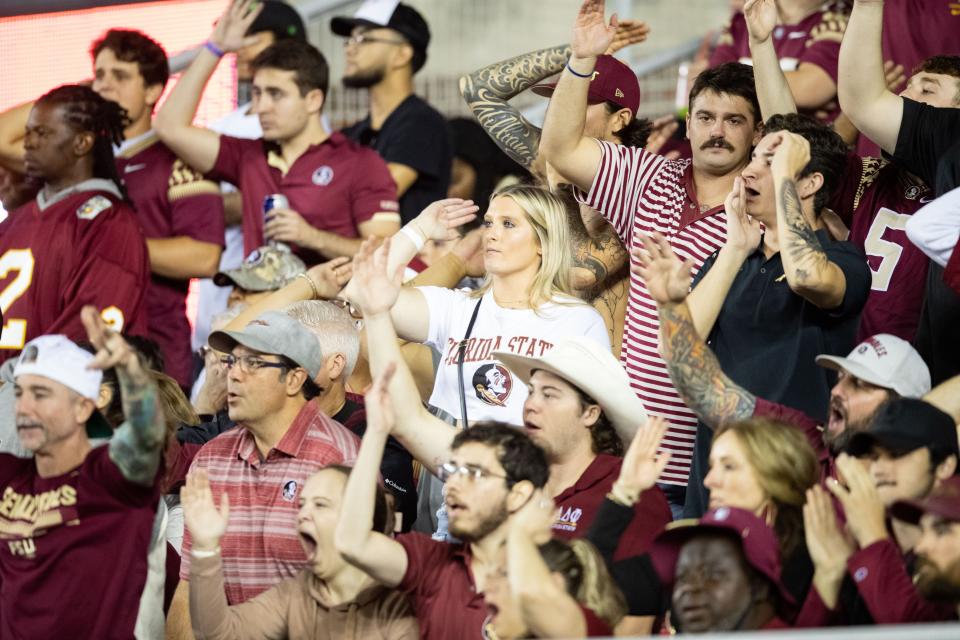If money matters, the future is brighter for Florida than FSU in the world of athletics
Spring practice has sprung in Gainesville. All in all, you’d rather be a football fan in Tallahassee.
FSU will be a trendy pick to make the College Football Playoff. Florida will be a not-so-trendy pick to finish in the middle of the SEC East.
I’m not here to make Gator fans avert their eyes, however. Short-term, things indeed look promising for the Seminoles.
Long-term, FSU would love to be in Florida’s spot.
“Something has to change,” FSU Athletic Director Michael Alford said, “because the status quo is unsustainable for a national championship program.”
Defensive help:Ready or not, Austin Armstrong is now charged with resurrecting Florida's defense
Texas, Oklahoma coming soon:What Texas and Oklahoma joining the SEC in 2024 means for the Florida Gators
He proclaimed that at a recent board of trustees meeting. The unsustainability comes from the lemon of a TV deal the ACC is stuck with. If things don’t change, FSU is going to get at least $400 million less than Florida will get in the next 13 years.
That’ll buy a lot of coaches, players, facilities, bells, whistles and distance between your biggest rival.
The ACC’s football-centric schools have fretted about this Armageddon for a couple of years. Alford’s speech to the trustees marked a shift in strategy.

Instead of talking about it privately, FSU is going to talk about it publicly.
The problem is that’s all it can do. There’s no foreseeable way for the Seminoles and the ACC to get out of the deal with ESPN/ABC.
They’ve had legal teams look for loopholes, hired consultants, explored every option that would fit in or out of a box. After all that, it’s the same conclusion:
We. Are. Screwed.
To which Florida fans say, pass the popcorn.
This is one show they can sit back, prop up their feet and really enjoy.
I’m not saying they should, since it’s a predicament you wouldn’t wish on any school or conference. At least you wouldn’t if you’re a sober, objective observer of college athletics.
Fans are occasionally sober but never objective. That’s what makes them fans. So I’d guess 99.3% of Gator Nation will develop a severe case of schadenfreude, which is German for “That’s What You Get For Joining a Basketball Conference!”
Moving to ACC made sense to FSU, Bowden in 1992
It made sense for FSU to throw in with the Tobacco Road crowd in 1992. As Bobby Bowden recalled:
“Between the SEC and the ACC, the best road to a national title was through the ACC. A national championship was my number one goal every year. The SEC is so tough, top to bottom, that they beat up on each other week after week.”
Two national titles followed. A third came in 2013, which is when the ACC started to wobble. FSU was flirting with the Big 12 and Maryland bolted to the Big Ten.
ACC pooh-bahs wanted long-term financial stability. They apparently consulted with Bernie Madoff and signed a TV deal that runs to 2036.
The financials looked OK at the time; then came the boom in TV rights fees. Somebody should have seen it coming, or at least seen the folly of having no exit ramp for 20 years.
ACC schools got about $36 million each in 2021. SEC and Big Ten schools were raking in $55 million, and that figure is zooming up. When the new deals kick in, Big Two conference members will make $80 million to $100 million a year.
“We cannot be $30 million behind every year compared to our peers,” Alford said.
Thirty million might be conservative. God knows what the SEC and Big Ten get when their TV rights are up for bid again in 2030 or so.
Seminoles generate 15% of ACC's media value
Alford broke out a study that found the Seminoles generate 15% of the ACC’s media value, but it gets the same 7% share the other 13 schools get. FSU, Clemson and Miami have floated the idea of a weighted distribution system, in which other schools would essentially give some of their coin to the big boys.
Good luck with that.
Even if Duke and Syracuse and Boston College chipped in, it would provide maybe $3 million to $5 million a year extra to the schools where football matters.
There’s always hope ESPN might renegotiate, but it’s not in the business of giving away profits. Any contractual relief would be way down the road.
FSU could always just up and leave the ACC. That would entail a $120 million exit fee, and the school’s media rights (and revenue) would stay with the ACC through 2036. That would essentially make the Seminoles worthless to a new conference.
“We have to do something,” trustee chairperson Peter Collins said.
But what?
Start a GoFundMe page? Have FSU President Richard McCullough speak to a joint session of Congress and appeal for an aid package?
If you have any ideas, please forward them to Alford. And if you’re a Florida fan, order some extra popcorn. This show has no end in sight.
David Whitley is The Gainesville Sun's sports columnist. Contact him at dwhitley@gannett.com. Follow him on Twitter @DavidEWhitley
This article originally appeared on The Gainesville Sun: Florida State's financial prospects give Florida sports fans reason for hope

